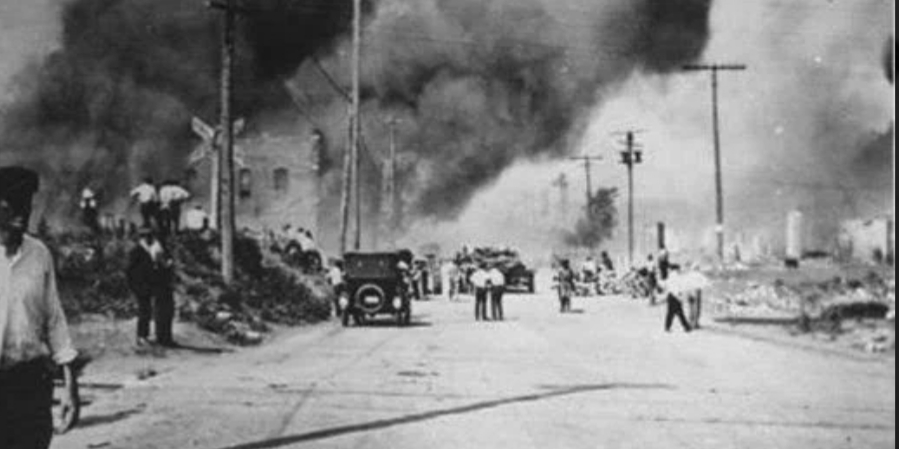Black Wall Street burns. Photo: Wikimedia Commons.
[Black Star Editorial]
The knee on the collective Black neck is what the United States has done to African Americans historically even after so-called Emancipation. The commitment to provide 40 Acres and a mule to formerly enslaved Africans was revoked after the Civil War and instead the U.S. has maintained African Americans as a permanent social underclass.
The murder of George Floyd has sparked uprisings in cities across the United States and around the world. Yet, the rage we see in the streets throughout this country also represents deep-seated woes, with many of them springing from the dynamics of focusing on keeping the Black underclass under control rather than dealing with poverty, lack of access to decent housing, good education, adequate healthcare, and jobs. Black poverty has been historically criminalized resulting in brutal policing and mass incarceration.
Any solution going forward must include a Marshall Plan-type reconstruction–finally putting into place the plans that were revoked two centuries ago. Companies like Amazon and other corporate behemoths should welcome the chance to work with government to co-finance the programs for economically empowering Black communities. Talk is cheap.
The 40 acres and a mule plan started as the civil war was ending and union general William T. Sherman issued Special Field Order 15, which authorized the distribution of 400,000 acres of land seized from the treasonous rebellious confederates, to formerly enslaved Africans who had created the wealth that made the U.S. the world power it is today, without compensation. The order stated that “each family shall have a plot of not more than forty acres of tillable ground.”
After President Abraham Lincoln was assassinated on April 15, 1865, his successor, President Andrew Johnson, reversed the order and many other projects meant to empower formerly enslaved Africans. This meant that most were “freed” from enslavement and ushered into impoverishment.
Even when some succeeded and created thriving prosperous Black communities, those were destroyed by the backlash from envious European Americans. If you don’t know the history of Tulsa, Oklahoma (“Black Wall Street”) please do some research. From May 31 through June 1, 1921, a thriving Black community during the era of segregation, with its business section–medical practices, restaurants, laundromats, theaters, barbershops, salons, hardware stores, banks and so forth–was razed to the ground by European American mobs that included officers meant to keep the peace, after a Black boy was falsely accused of “insulting” a white woman.
Black people were dragged from their homes or business premises and killed in the streets. As many as 1,200 homes were burned down. Bombs were reportedly dropped from planes on their homes. As many as 300 (possibly many more) Black people were massacred by European American mobs. Yet some accounts still refer to the ethnic cleansing as the “Tulsa Riots.”
Riots?
No one was ever punished for the crimes; there was no compensation for the loss of lives and properties. (The contemporary bigot in the White House whose only concern is about the sanctity of corporate properties and those of the affluent during the current uprisings needs to be taught this history-not that it would matter). Today, the story of the African American permanent underclass can no longer be suppressed in the Post Covid-19 and George Floyd era.
Instead of resolving socioeconomic problems the establishment have historically resorted to brute force as the solution. Killer cops like Chauvin, Daniel Pantaleo (New York City, victim Eric Garner), and Darren Wilson (Ferguson, victim Michael Brown) believe they are merely doing “their job”– keeping the underclass or “barbarians” in “their place” to maintain European American privileges. They believe they are “doing it for the team.”
Anyone who treats these systemic attacks as merely episodic anomalies because a particular officer woke up in a bad mood on a given day is burying his or her head in the sand.erely episodic anomalies because a particular officers woke up in a bad mood on a given day is burying his or her head in the sand.








